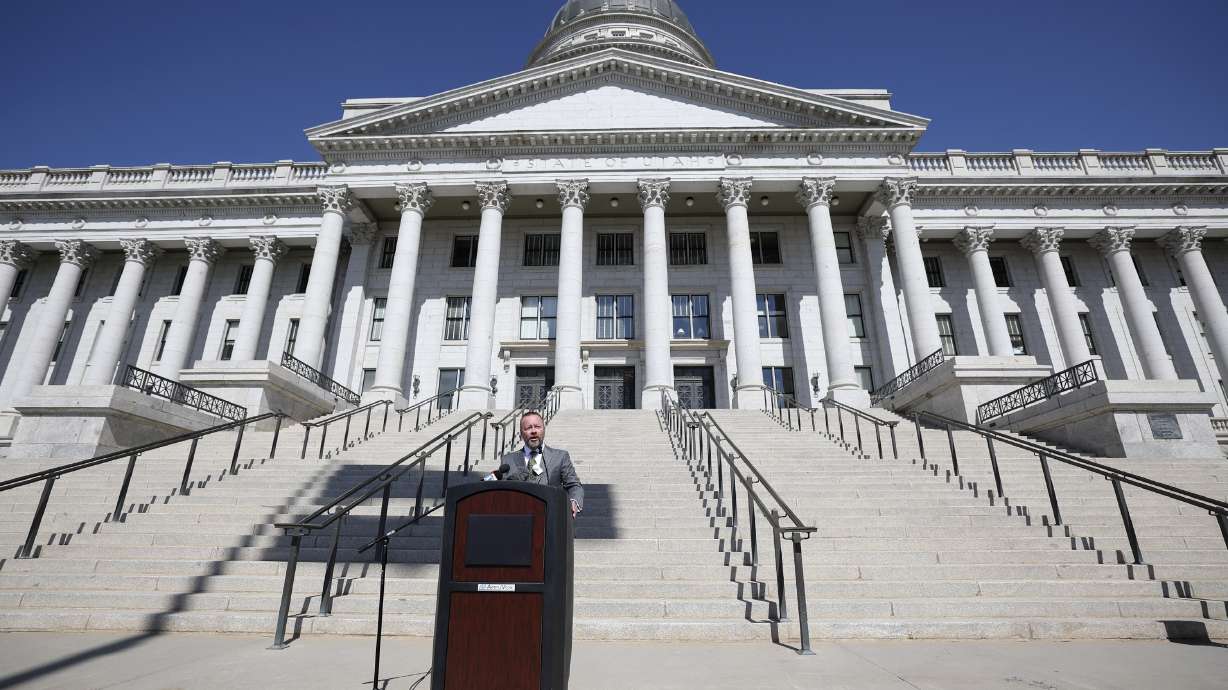Estimated read time: 4-5 minutes
This archived news story is available only for your personal, non-commercial use. Information in the story may be outdated or superseded by additional information. Reading or replaying the story in its archived form does not constitute a republication of the story.
SALT LAKE CITY — A pair of watchdog organizations have filed amicus briefs in a lawsuit asking the Utah Supreme Court to overturn Utah's new congressional map and give an independent redistricting commission power to create political boundaries in the future.
The suit, filed in Utah's 3rd Judicial District Court by the League of Women Voters of Utah and Mormon Women for Ethical Government, alleges the Utah Legislature enacted an "extreme partisan gerrymander" when it approved the new map, which the groups say undermines Utahns' right to meaningfully participate in elections.
Common Cause, a national anti-gerrymandering organization, and States United Democracy Center both recently filed amicus — or "friend-of-the-court" — briefs siding with the plaintiffs in League of Women Voters of Utah v. Utah State Legislature.
"Politicians should not be able to choose their voters, but that's exactly what partisan lawmakers are attempting to do," stated Dan Vicuña, national redistricting manager for Common Cause. "By doing away with the citizen-led redistricting commission, lawmakers want to hold onto power for themselves. We hope that the court will uphold the will of the people by restoring the (commission's) authority and the power of the people to choose their leaders."
Utahns voted in 2018 to approve an independent redistricting commission when they passed Proposition 4 in 2018. Redistricting happens just once a decade, meaning new political boundaries can shape political power for years to come.
In 2020, the Utah Legislature compromised with Better Boundaries, the group behind Proposition 4, and agreed to let the commission recommend new maps while still giving lawmakers the final say.
Lawmakers ignored the commission's recommendations in 2021 and went with a map they drew themselves.
In arguments similar to those made by the plaintiffs, the States United Democracy Center argued that the gerrymandering "undermines the lynchpins of representative government: building consensus, working in collaboration, and finding common ground for the good of the whole."
David Irvine, a former member of the Utah House of Representatives, filed the brief together with States United Democracy Center.
"The modern practice of extreme partisan gerrymandering is not just inconsistent with our founding principles; it harms the workings of our democracy. ... Partisan gerrymandering encourages polarization, hindering the sensible governance that has been the cornerstone of our nation's success," the brief reads.
Common Cause argued that the Utah Independent Redistricting Commission met the highest standards for nonpartisan redistricting.
"Our effort in acting as a friend of the court in this brief is to highlight the work of the Utah Independent Redistricting Commission," Vicuña stated. "The UIRC was a remarkable example of how neutrality, fairness and transparency can protect the rights of all voters and preserve public trust and confidence in the outcomes of our elections and in our democracy."
"Unfortunately, the Utah Legislature chose to ignore the voice of the people and the labors of the UIRC, first when it repealed Prop 4, and then again when it devised and enacted a gerrymandered congressional map," their brief reads.
Groups like the Brennan Center for Justice at New York University's School of Law and the American Civil Liberties Union also filed in support of the plaintiffs.
Several groups also filed briefs in support of the existing map, including Utah Republican Reps. Blake Moore, Chris Stewart, John Curtis and Burgess Owens.
The congressmen argued that members of Congress have an interest in the drawing of the state's congressional maps, which have the potential to affect the makeup of their districts.
They also said that the U.S. Congress is primarily responsible for reviewing redistricting maps under the Elections Clause of the Constitution, which says that "times, places and manner of holding elections ... shall be prescribed in each state by the legislature thereof; but the Congress may at any time by law make or alter such regulations."
"The delegation understands, however, that the primary responsibility for oversight in this area resides not in state courts but in the Congress of the United States," their brief says. "This Court should not do as respondents ask and invalidate a congressional districting plan under vague constitutional clauses in the absence of a clear anti-partisan-gerrymandering rule created by the Legislature of the State of Utah."
A district court judge denied the Legislature's motion to dismiss the case in October, allowing it to move forward. The Supreme Court will hear oral arguments in the case on July 11.
Correction: An earlier version incorrectly stated that David Irvine is a former Utah Supreme Court justice. He is a former member of the Utah House of Representatives and a lawyer, but did not serve on the Supreme Court.









